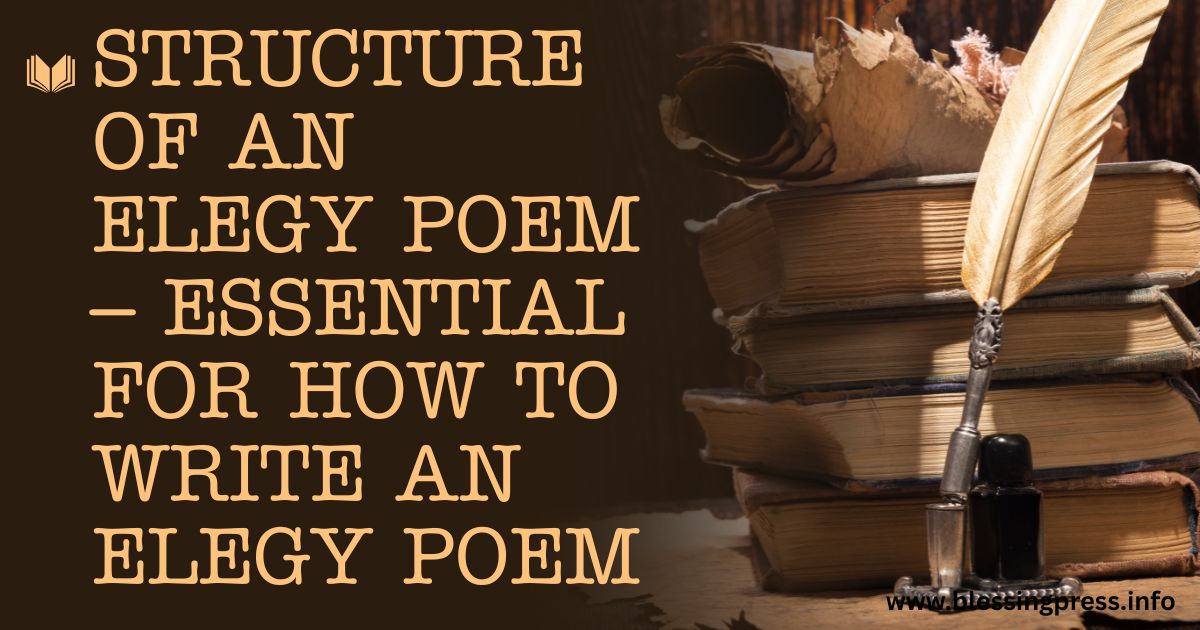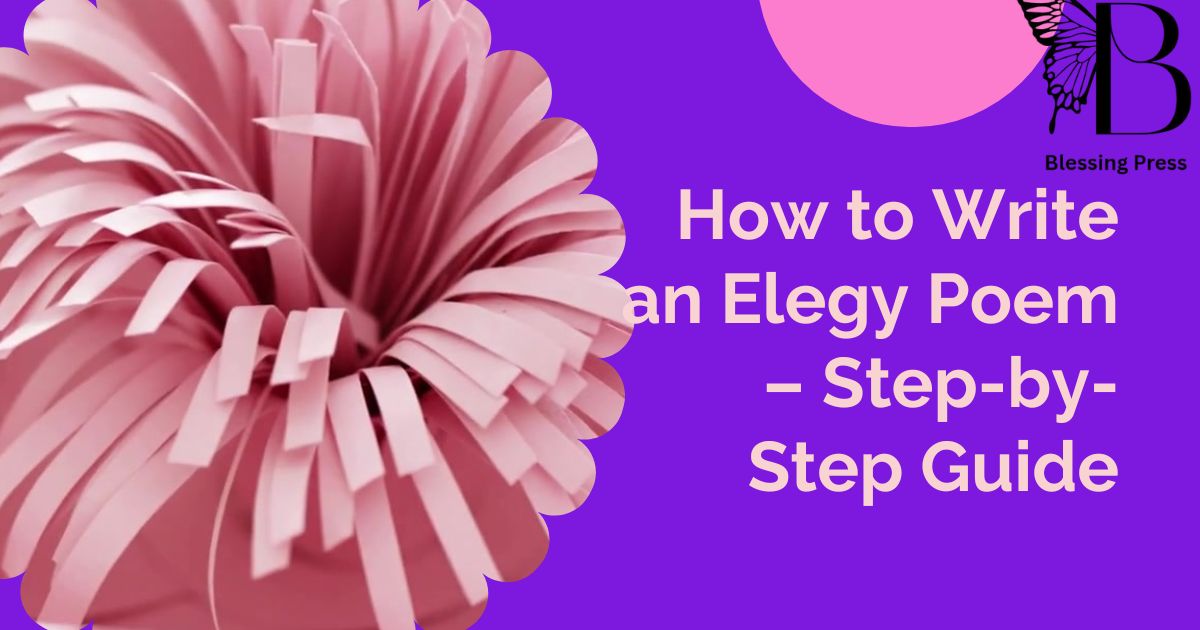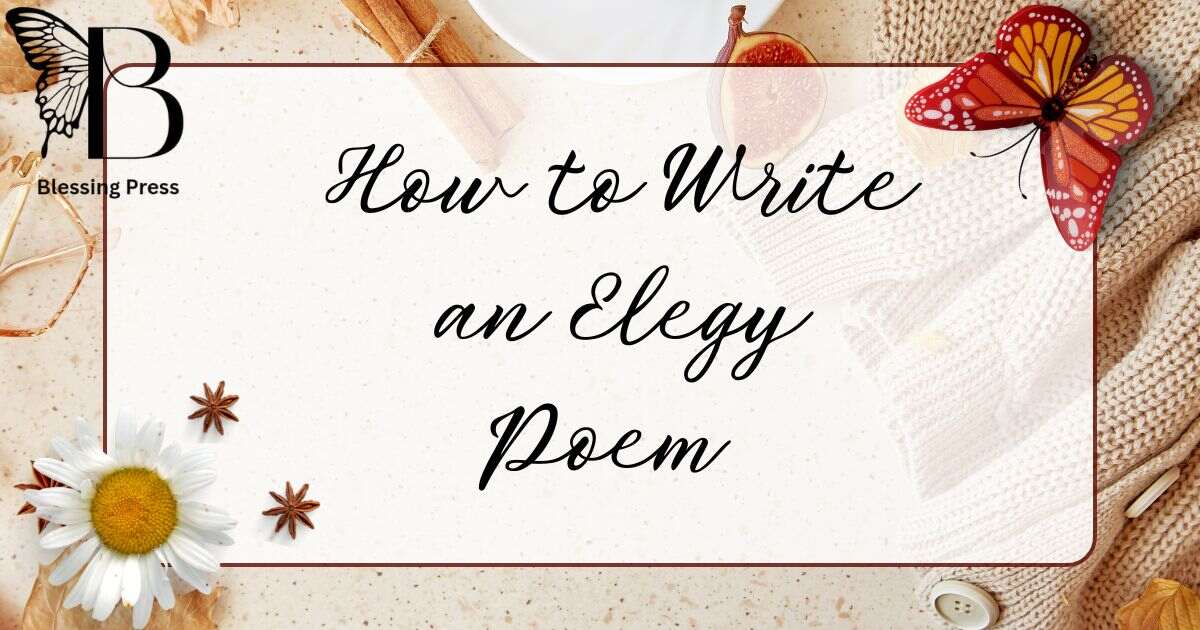Have you ever struggled to find the right words to honor someone you’ve lost? That’s where the timeless beauty of elegy poems comes in.
An elegy isn’t just poetry it’s a voice for grief, memory, and healing. In this guide, you’ll discover everything you need to know about how to write an elegy poem from its meaning and history to structure, examples, and a step-by-step process.
Whether you’re a beginner or an experienced writer, this article will help you turn sorrow into art and give your emotions a lasting place on the page.
What Is an Elegy Poem? Understanding How to Write an Elegy Poem
An elegy poem is a type of poetry that mourns death, loss, or deep absence. Traditionally, it carries a serious tone, yet it often moves toward hope and consolation.
If you want to master how to write an elegy poem, you must first understand its core traits:
- Mourning: expressing sorrow or grief
- Reflection: meditating on life, death, and meaning
- Praise: celebrating the person, place, or idea lost
- Consolation: ending with peace or redemption
Unlike a eulogy, which is spoken at funerals, an elegy is crafted as literature—something lasting that readers can return to again and again.
A Brief History of Elegy Poetry – Why Learning How to Write an Elegy Poem Matters
To truly know how to write an elegy poem, it helps to understand its long history.
- Ancient Greece: The term “elegeia” described verses in elegiac couplets. These were not always sad; they touched on war, love, and philosophy.
- Roman Elegies: Writers like Ovid adapted the form into Latin, often blending love with myth.
- Renaissance & English Tradition: Elegies shifted more toward death and mourning. Poets like John Milton used the form to honor friends.
- Modern Times: Writers such as Walt Whitman and W.H. Auden shaped elegy into flexible, free verse forms.
Every era redefined the elegy, but one thing stayed constant: it remained a tool for grief, memory, and healing. That’s why anyone curious about how to write an elegy poem should explore its history.
Structure of an Elegy Poem – Essential for How to Write an Elegy Poem

When people ask how to write elegy poem, structure is usually the biggest question. While modern poets enjoy flexibility, traditional elegy poems had clear patterns.
Classical Elegy Form
- Written in quatrains (four lines each)
- ABAB rhyme scheme
- Iambic pentameter rhythm (10 syllables per line)
Emotional Structure of Elegy Poems
- Mourning: beginning with grief and sorrow
- Praise: honoring the deceased or lost subject
- Consolation: offering closure, peace, or hope
Even if you choose free verse, these stages give your poem emotional balance. Understanding structure is key to mastering how to write elegy poem that truly resonates.
Read Also: Killer Roasts That Will Leave Everyone Speechless 2025
Famous Elegy Poem Examples – Learning Through Models
Studying examples is one of the best ways to learn how to write elegy poem. Here are some influential ones:
- “Lycidas” by John Milton (1637): A pastoral elegy for a friend, filled with Christian themes.
- “Elegy Written in a Country Churchyard” by Thomas Gray (1751): A meditation on death and equality in the grave.
- “In Memoriam” by Alfred Lord Tennyson (1850): A monumental elegy mourning Arthur Hallam.
- “O Captain! My Captain!” by Walt Whitman (1865): Honoring Abraham Lincoln through symbolism.
- “In Memory of W.B. Yeats” by W.H. Auden (1940): Divides grief into lament, tribute, and consolation.
By reading these, you’ll see different techniques and tones, which makes it easier to decide how to write an elegy poem in your own style.
Why Do Writers Choose to Write Elegy Poems? – Purpose Behind How to Write an Elegy Poem
Before learning how to write elegy poem, ask yourself why writers are drawn to this form. The reasons are both personal and universal.
- Honoring someone: preserving memory in art
- Processing grief: transforming emotions into words
- Connecting with readers: mourning is a shared human experience
- Offering hope: guiding readers from sorrow to peace
Ultimately, elegies help both writer and reader heal. That’s why understanding how to write an elegy poem can be powerful—not just as art, but as therapy.
How to Write an Elegy Poem – Step-by-Step Guide

Now let’s get practical. Here’s a clear process for how to write an elegy poem effectively:
- Choose a subject: A person, idea, or event you want to honor.
- Reflect on emotions: Spend time remembering your feelings.
- Select a style: Traditional stanza form or free verse.
- Begin with mourning: Start your poem by expressing sorrow.
- Move to praise: Celebrate the subject’s qualities or impact.
- Conclude with consolation: Offer peace or hope at the end.
- Revise carefully: Polish imagery, rhythm, and flow.
If you follow these steps, you’ll understand not only how to write an elegy poem, but also how to make it heartfelt and memorable.
FAQs;
Can I write an elegy for someone still alive?
Yes, you can. Learning how to write an elegy poem for a living person lets you honor them with gratitude before loss.
Do elegy poems always have to rhyme?
Not necessarily. When exploring how to write an elegy poem, you’ll see many modern ones use free verse without rhyme.
How personal should an elegy be?
Very personal. Understanding how to write an elegy poem means sharing real emotions or memories that make the tribute unique.
Can an elegy bring comfort to the writer too?
Absolutely. If you know how to write an elegy poem, it can heal your own grief while honoring someone special.
Is an elegy only about death?
Mostly yes, but while studying how to write an elegy poem, you’ll learn it can also mourn lost love or fading traditions.
Conclusion;
Writing an elegy is more than arranging words on paper; it’s about giving shape to emotions that often feel too heavy to carry. When you learn how to write an elegy poem, you discover a way to honor memory, express grief, and find comfort in creative expression.
Whether you follow a traditional structure or a modern free verse style, the heart of an elegy remains the same: truth, love, and remembrance. By practicing how to write an elegy poem, you transform loss into lasting poetry that speaks to generations.

hy, My name is Malik Asif. am a blogger form last 10 year. am a exper

